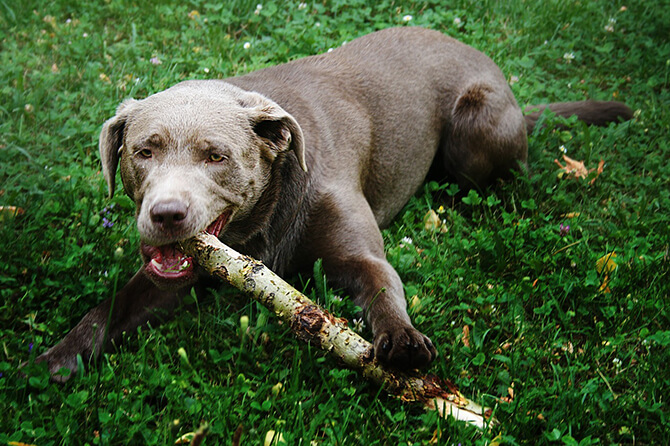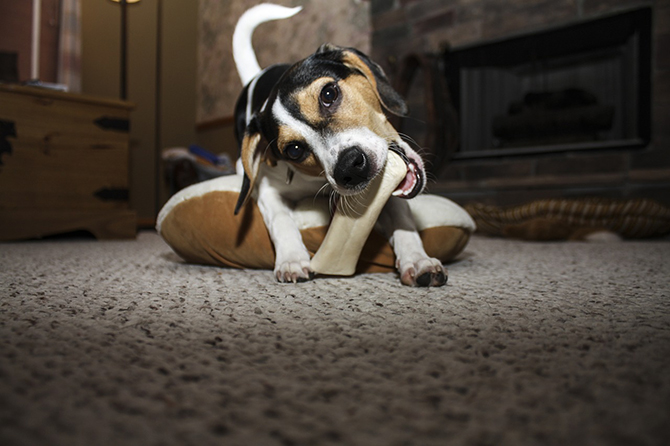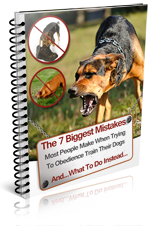
Chewing is a widespread and very common activity for dogs - similar to how humans watch TV as a pastime, dogs chew because they're bored, because they don't know what else to do, because they're lonely, and because they just plain like it. Sometimes there are behavior reasons for dog chewing that you'll need to address.
Just like humans, dogs adopt compulsive behaviors as a response to stress in their environments. Boredom, loneliness, and anxiety are all leading causes of destructive behavior like chewing, so it's necessary to consider the underlying causes that your dog may be chewing before you can properly address the issue.
So Why Does My Dog Chew?
- Have you chosen a breed of dog with a natural tendency to chew? A lot of breeds have actually been trained to use their mouths a lot in the course of day to day life. Hunting dogs, such as gun dogs like golden and labrador retrievers, spaniels, and hounds (Afghans, Ridgebacks, Bassets, etc) all have a real genetic predisposition to chew, mouthe and teethe things. Be aware of your dog's temperament and, if you sense that your dog is happier with something in his mouth (and please be aware that this is a state of affairs favoured by almost all dogs) then make sure that you have a ready and varied supply of tempting chew toys on hand at all times.
- Have there been changes in circumstance lately? Dogs are creatures of habit, and don't react well to having their routine disturbed. For especially sensitive dogs, even a change in furniture layout is enough to spark anxiety. Dogs under stress have to adjust their behavior in order to cope; this can range from chewing to barking to digging to neurotic behaviors like tail-chasing.
- Are you spending enough time with your dog? Dogs have always been pack-oriented animals. Due to their instinctively sociable natures (safety in numbers) they actually require plenty of time interacting with you. Being with people is just as important to dogs as it is to humans - don't ignore your dog or leave it outside when everyone else is inside (the concept of 'outside dogs' is just plain cruel. How would you feel being locked outside, staring in through the windows at the rest of your family enjoying themselves inside? This is exactly how your dog would feel.). If you've been especially busy lately and haven't had much time to spend with your dog, take steps to correct this: either adjust your schedule, or have someone else spend time with him to ensure that he's able to interact with someone that he cares for.
- Is your dog getting enough exercise?Most dogs, apart from the more lethargic toy breeds, both love and need to run and play, and this provides a great excuse for you to get out for some fresh air and exercise as well. Depending on the breed, your dog will need anything from one short brisk walk of about twenty minutes to more than two hours of vigorous running, swimming, and hiking. Ensure that you're aware of your dog's requirements, and make sure you're meeting them!If you aren't inclined to spend this much time exercising each day (and it can be a genuine problem for some people), consider involving your dog in agility courses or some other activity suitable for his breed (for terriers, try go-to-earth clubs; for the larger working breeds, try carting and weight-pulling competitions; guarding breeds enjoy schutzhund; scent hounds love tracking activities; etc). Excess energy is one of the main reasons that dogs chew. If you allow him the opportunity to expend his energy in more constructive ways, the problem will diminish or vanish altogether.
- Does your dog have enough to occupy his mind? Bored dogs are destructive by default. Most dogs are pretty smart and get bored quickly - what kind of mischief do you think you'd get into if you were left alone and bored all day, every day? Fortunately, it's not difficult to stimulate your dog's mind. Most pet stores, vets, and even supermarkets sell puzzles and games for your dog that will keep him occupied for hours on end - for example, the Buster cube, which dispenses a dog treat every time it's turned over a certain number of times; or Kong toys, which are less intellectual but more appealing to a lot of dogs: you fill the hollow cavity inside with a delicious food substance (soft cheese, peanut butter, meat paste), and the dog spends a long time trying to extract every last morsel.
- Have you trained your dog properly? Unfortunately, a lot of inexperienced owners allow puppies to get away with behavior that they wouldn't tolerate from an adult dog - and this includes chewing on furniture and other household items. Once the dog gets big enough to actually do some real damage, most people catch on - but by this stage the dog's familiar with being able to chew on anything that appeals, and consequently it takes a lot longer to train him in what he can and can't chew on. It's usually still possible to 'untrain' your dog, but it's a lot quicker (and easier!) to just be consistent from the very beginning. No dog should be allowed to chew anything inappropriate, no matter how small and cute he is.
While most dogs will chew given the opportunity (or the lack of other pastimes), some are definitely capable of doing a lot more damage than others due to a natural preference for the activity - for example, dogs that have been bred and trained to use their mouths to accomplish tasks (retrievers). It's virtually impossible to train your dog not to chew whatsoever; a more effective (and realistic) goal is to train him to chew only appropriate object like toys, rawhide chews, and the like. Especially when teething, it's really important that your dog has access to delectable chew toys at all times. You can't really blame a dog with sore, aching gums for chewing something soft and appealing like a cushion, if he doesn't have anything else available to him. Teach him that only toys are for chewing, and stick to that rule.
| Got A Chewing Dog? Put an end to your Dog's excessive Chewing today with Daniel Stevens! | Secrets to Dog Training - Dog Training See what the world's most popular Dog Training Guide can do for your Dog. |
Remember, there are many behaviors reasons for dog chewing that you dog may be displaying. In fact, such behavior is often your dog's way of communicating with you. Learn to interpret these signs and respond appropriately, taking corrective action when necessary. In some instances this will mean modifying your own behavior, and at other times you will need to take some time to teach your pup what is acceptable. Do whatever it takes to nurture this special relationship and establish house rules you can both live with.


